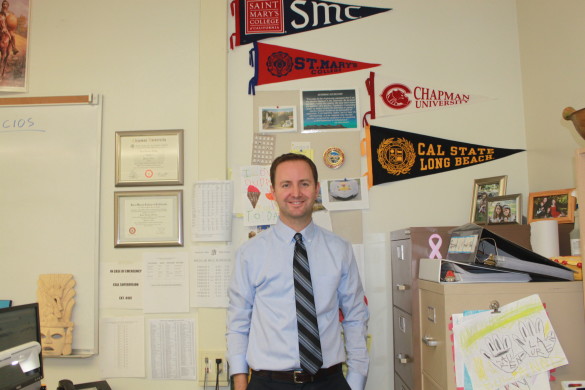Spanish teacher Jim Diecidue stands proudly in front of his college banners. Photo by Amanda Hadleyby Aozora Ito and Amanda Hadley, Staff Writers
In honor of college and career day, Baron Banner asked some teachers at Fountain Valley High School on their college experiences and their opinions on whether students should attend a four year university or community college after high school.
Jane Springer, a math teacher, attended Northwestern University for her Bachelor Science Degree in Industrial Engineering, University of California, Los Angeles for their Fitness Trainer Certification Program and National University for her teaching credentials and master’s degree in Education.
“I met so many people with diverse backgrounds from all over the worl, and employers take notice when you have a degree from a university like Northwestern,” said Springer. “I also have a great network of friends from school who are very successful; doctors, lawyers, CEOs and the manager of the New York Yankees.”
Springer also explained her college’s weaknesses. She said that some teachers from foreign countries had strong accents which were nearly impossible to understand. She was disappointed because she had to pay a lot of money to sometimes teach herself.
Band and Orchestra teacher, Mark Irons, compared his experience of attending a local college (California State University Long Beach) and a university on the east coast (New York University). At CSULB, Irons enjoyed the fact that it was local, had a great music program and had plenty of performance opportunities. At NYU, he got to experience “…actual seasons and work with professionals in the industry.”
However, attending a local university can be both an advantage and a disadvantage. Irons added that CSULB was too close to home and that it did not have a marching band program. While attending NYU, he noted that the cost of living was expensive and that there were few job opportunities after he graduated.
When asked what their thoughts are on attending a four year university after high school, teachers had varying opinions. For students that are worried about their finances or do not know what they want to do, teachers advised that a junior college was a safe option.
“I went to a junior college first and was thankful for the experience. Few 18-year-olds know what is in their best interest,” said Chemistry teacher Mark Olsberg. “Going to a junior college allowed me the freedom to pick and choose from a variety of classes and fields without sacrificing my entire bank account.”
Irons and Springer also advised that a two-year college is perfect for students who are still figuring out what they want to do. With the cost of college nowadays, they recommended students start with two-year colleges.
On the other hand, teachers said that the experience of attending a university is important.
Spanish teacher Jim Diecidue said, “I am very happy that I went straight to a four-year school and I believe it allowed me to have a fuller college experience.”
Furthermore, English teacher Doug Wilton said, “You don’t get a sense of community by commuting to a school or going to community college. College goes by so quickly that two years is a blur and you don’t foster relationships in two years like you would in four.”
There are pros and cons to attending either a junior college or a four-year university, but overall, teachers believe that students should research and figure out what they want to major in, figure out that major’s employment possibilities and focus on what they truly love and want to do.






